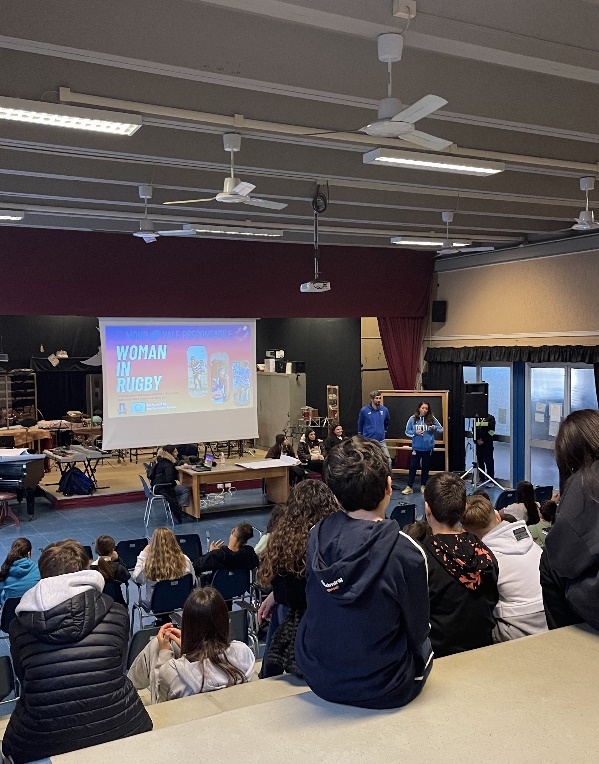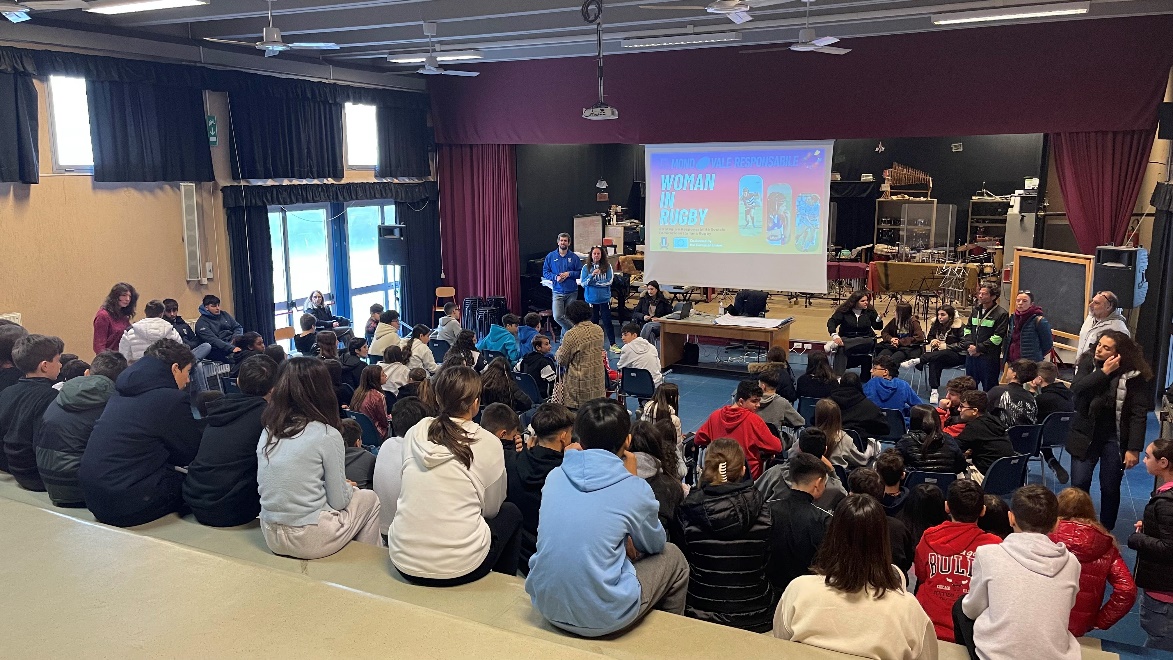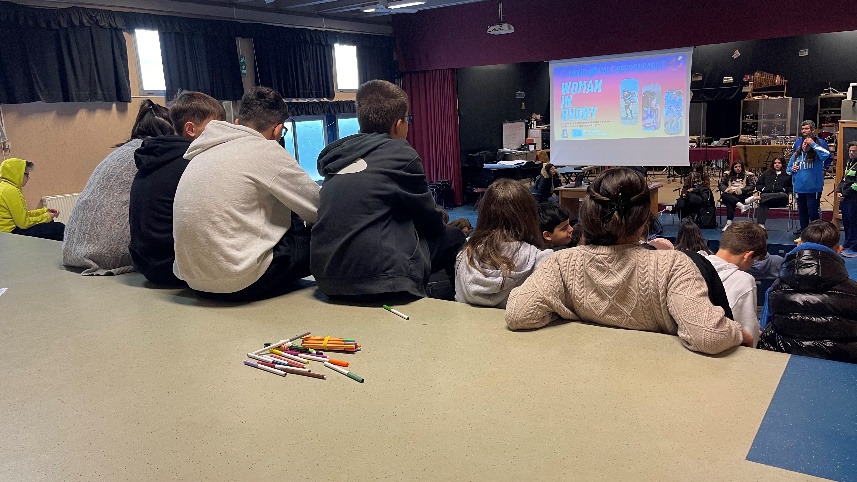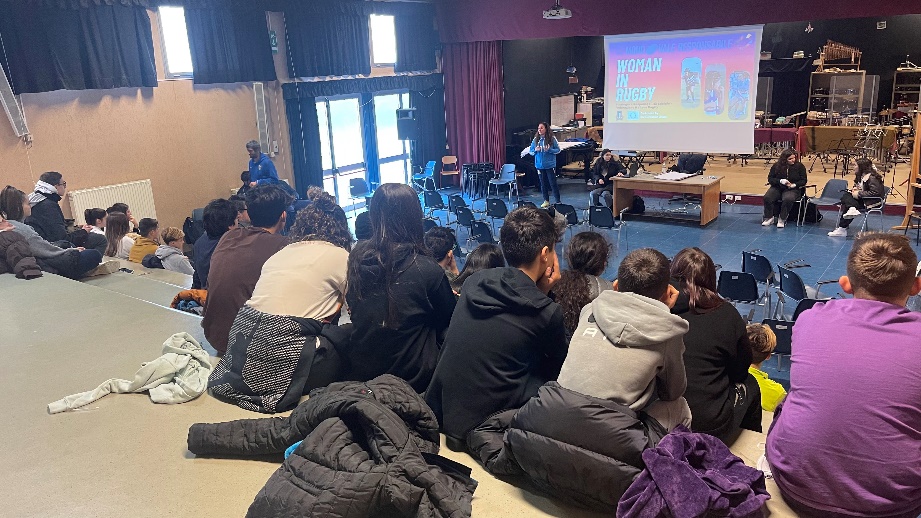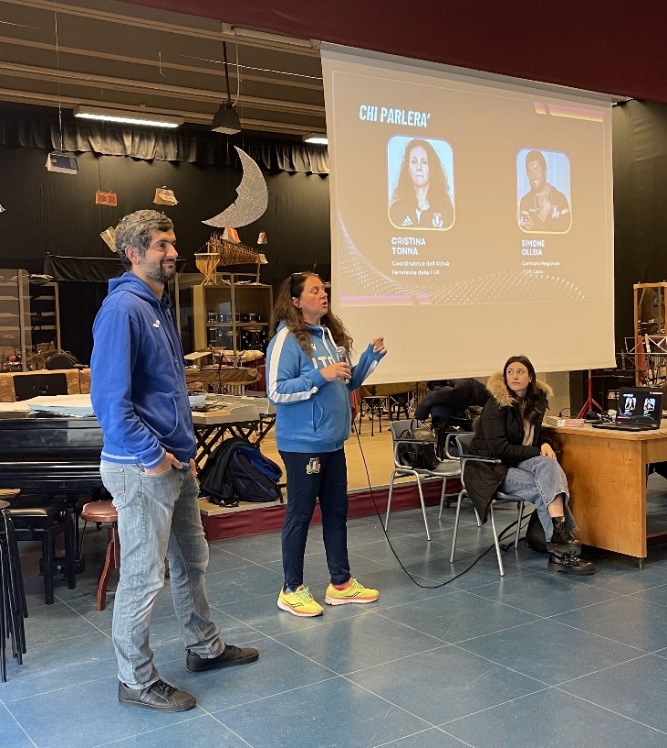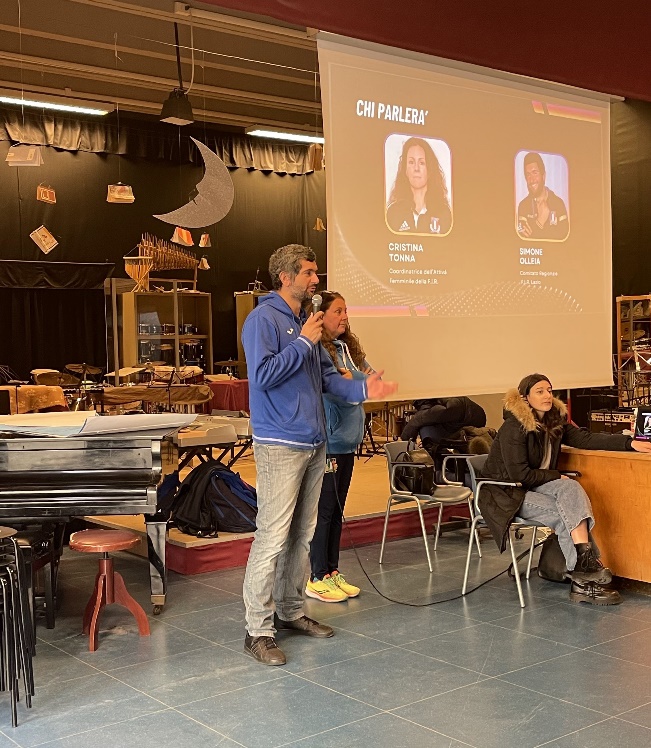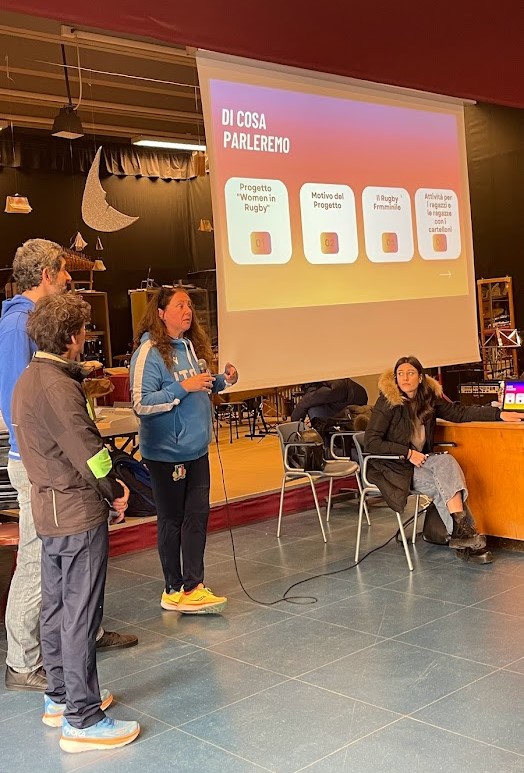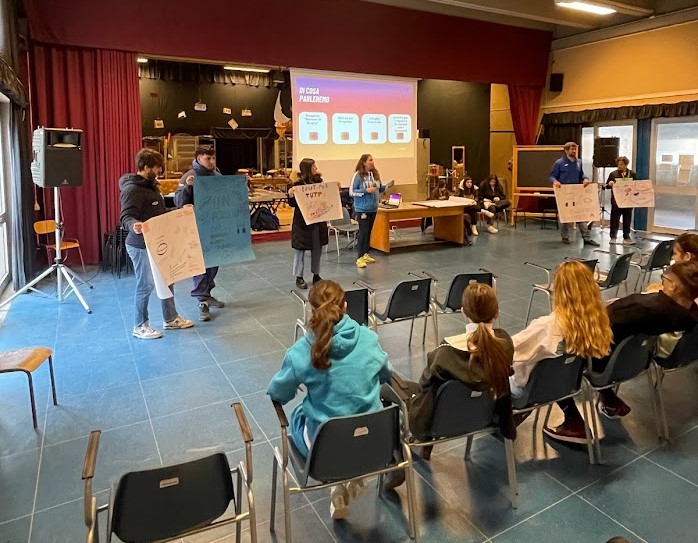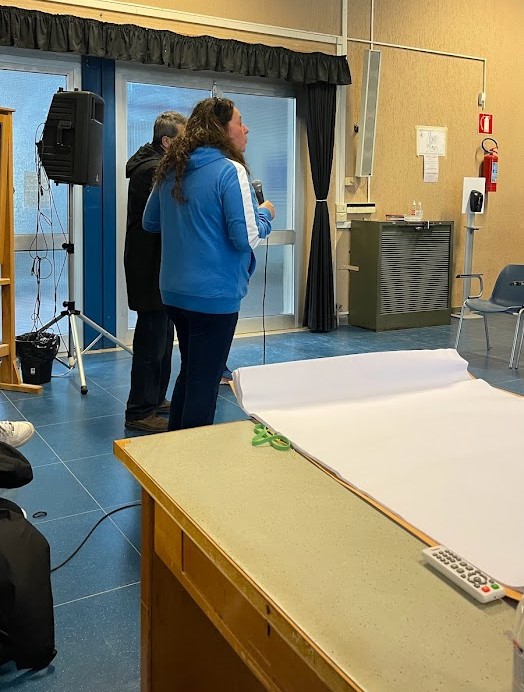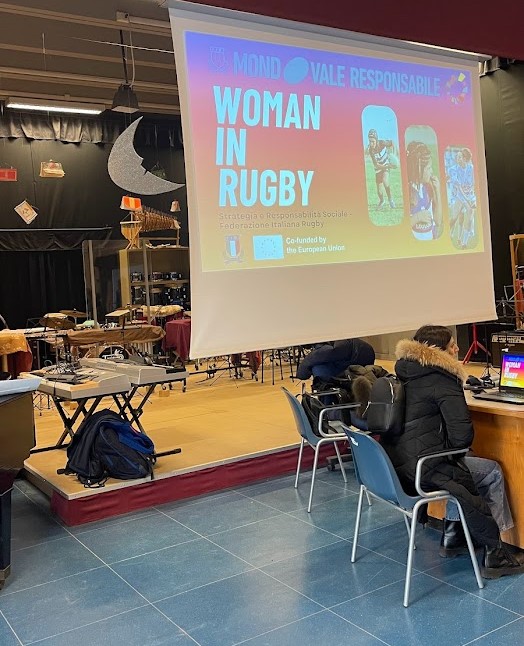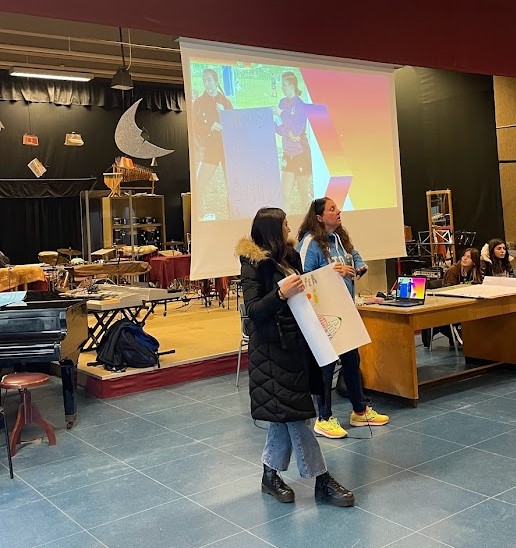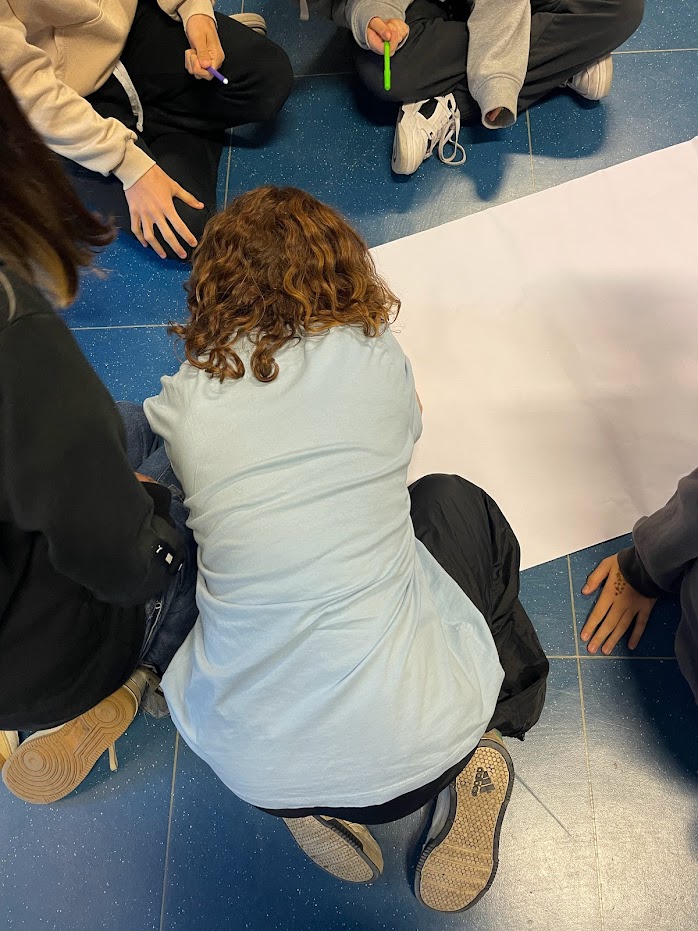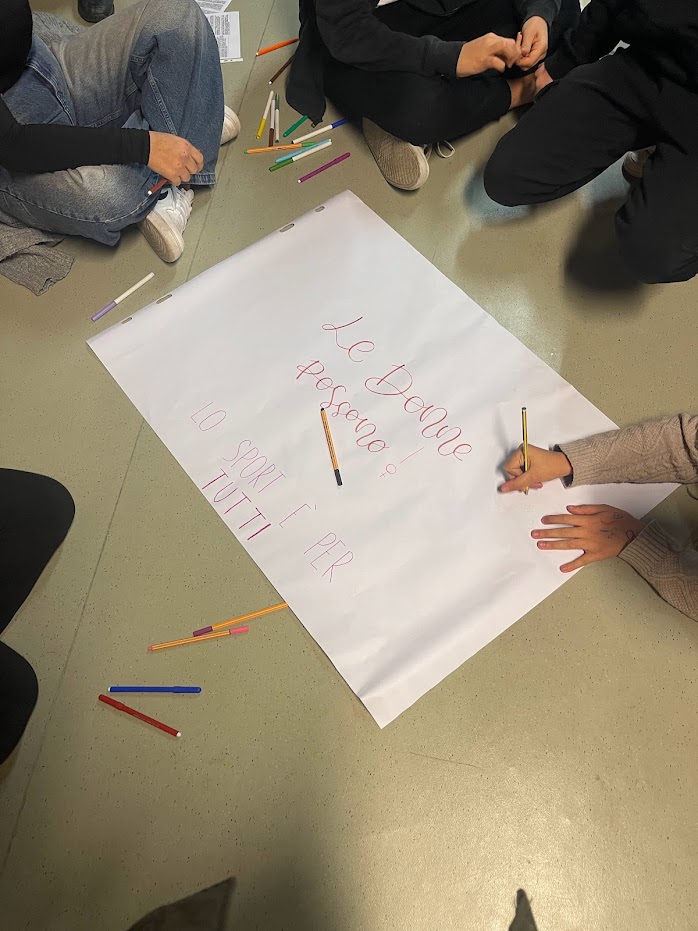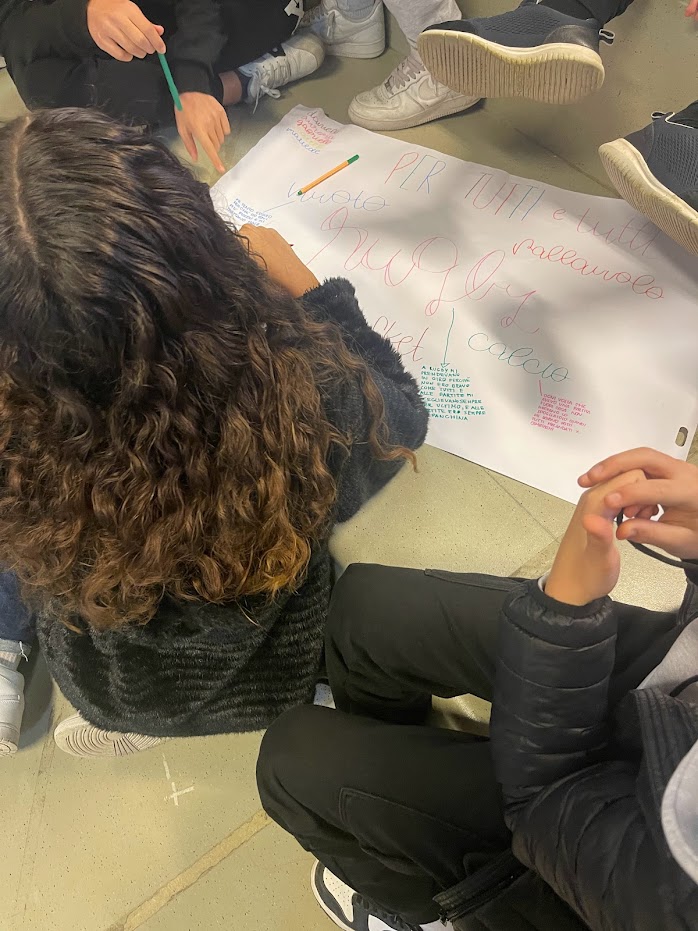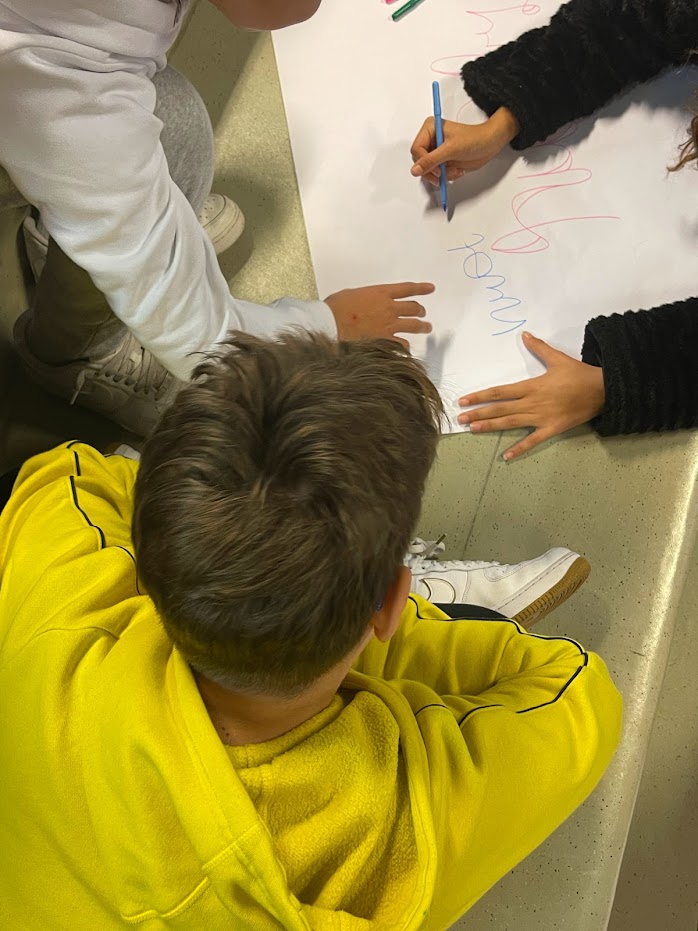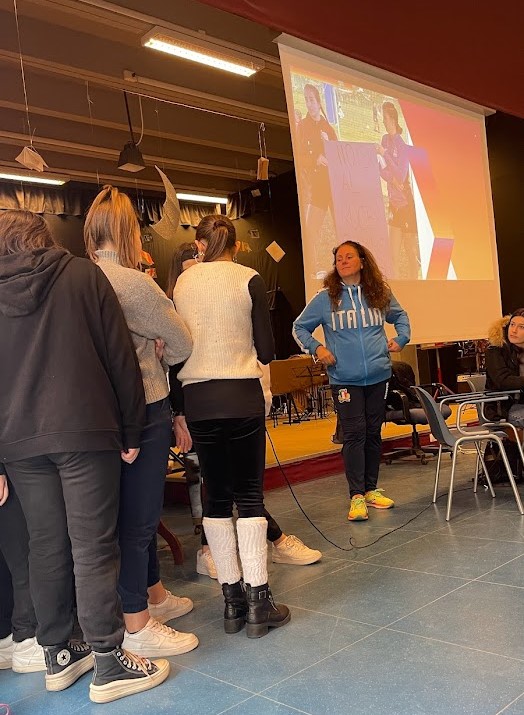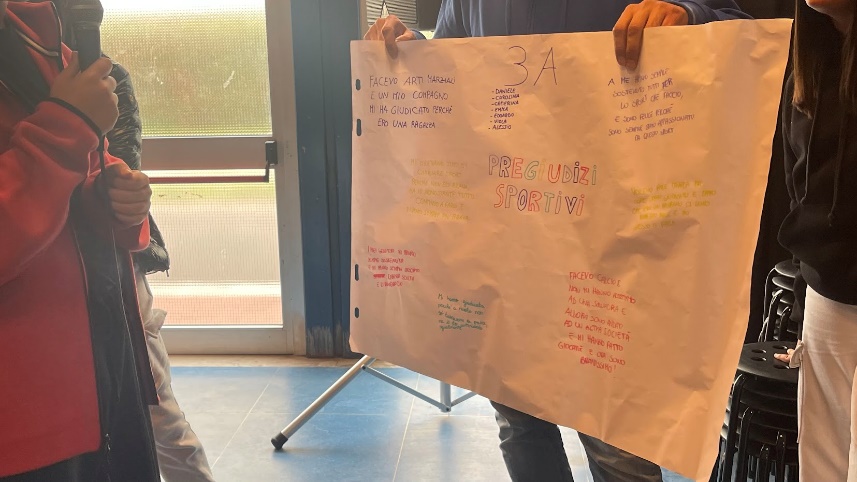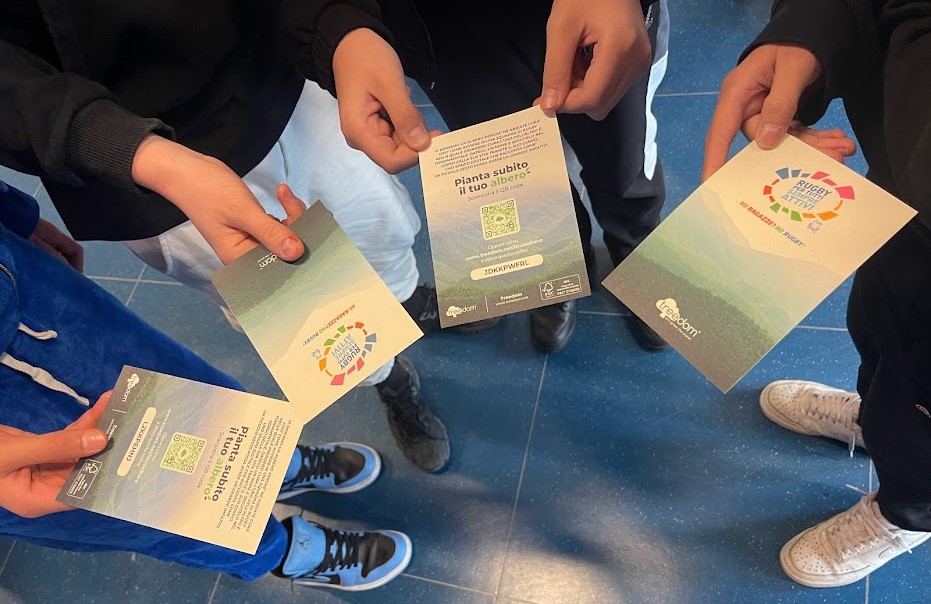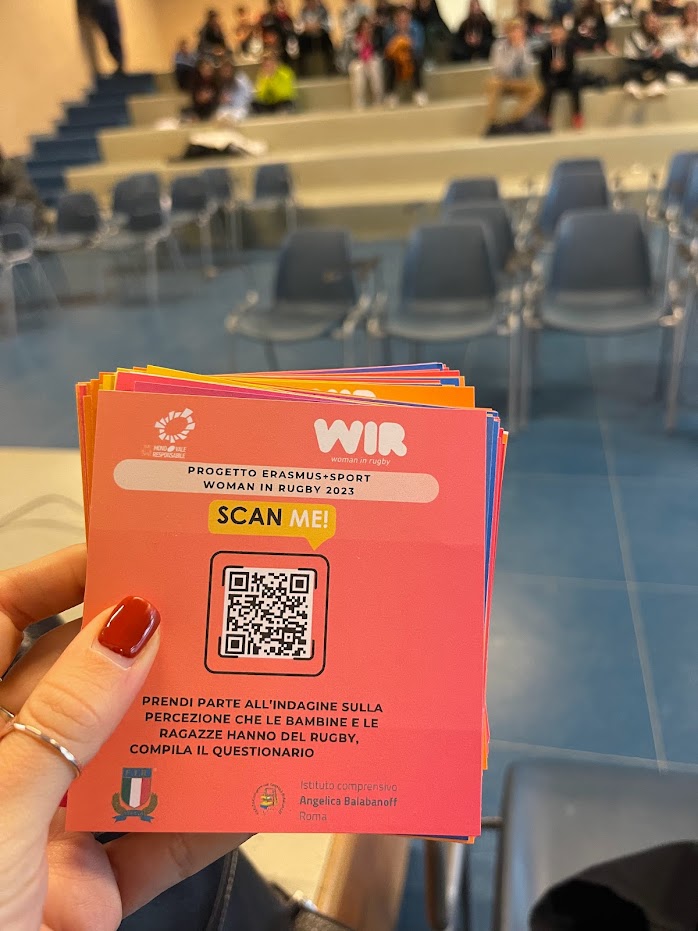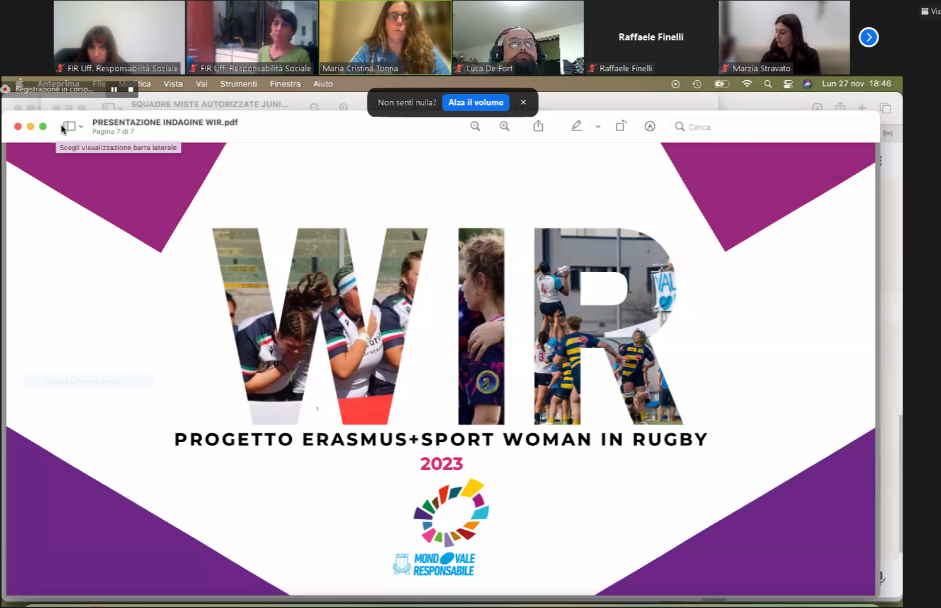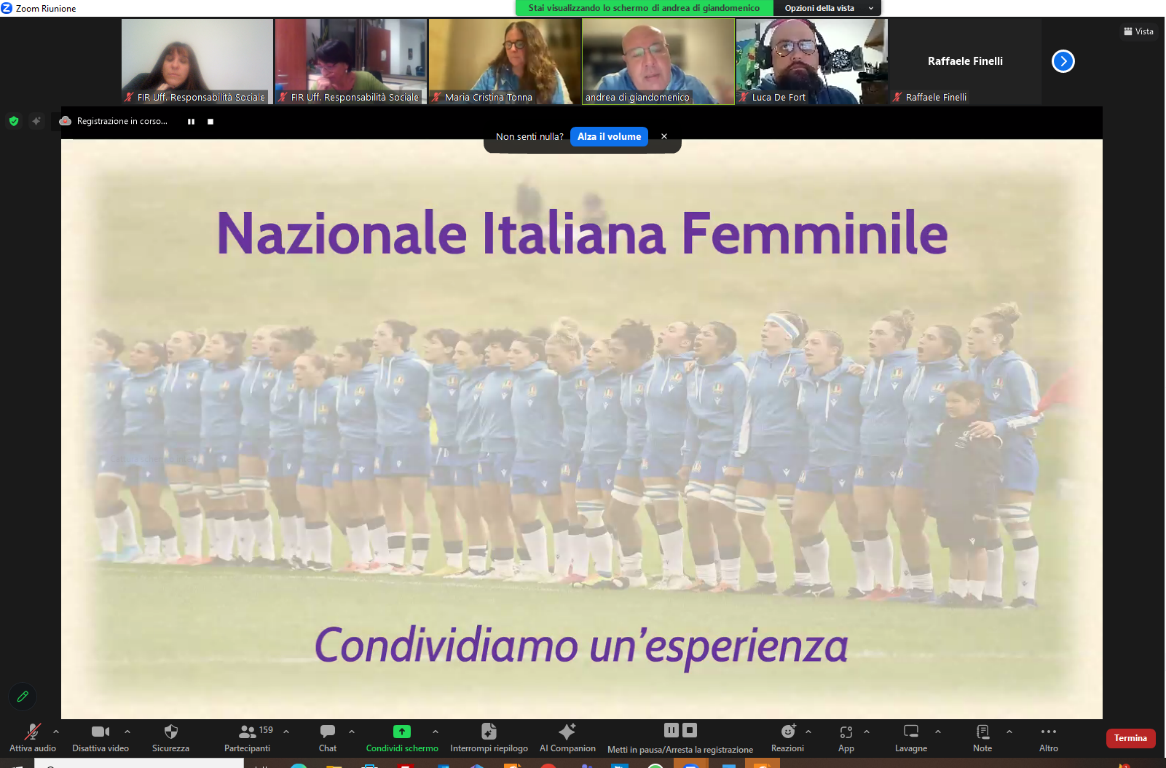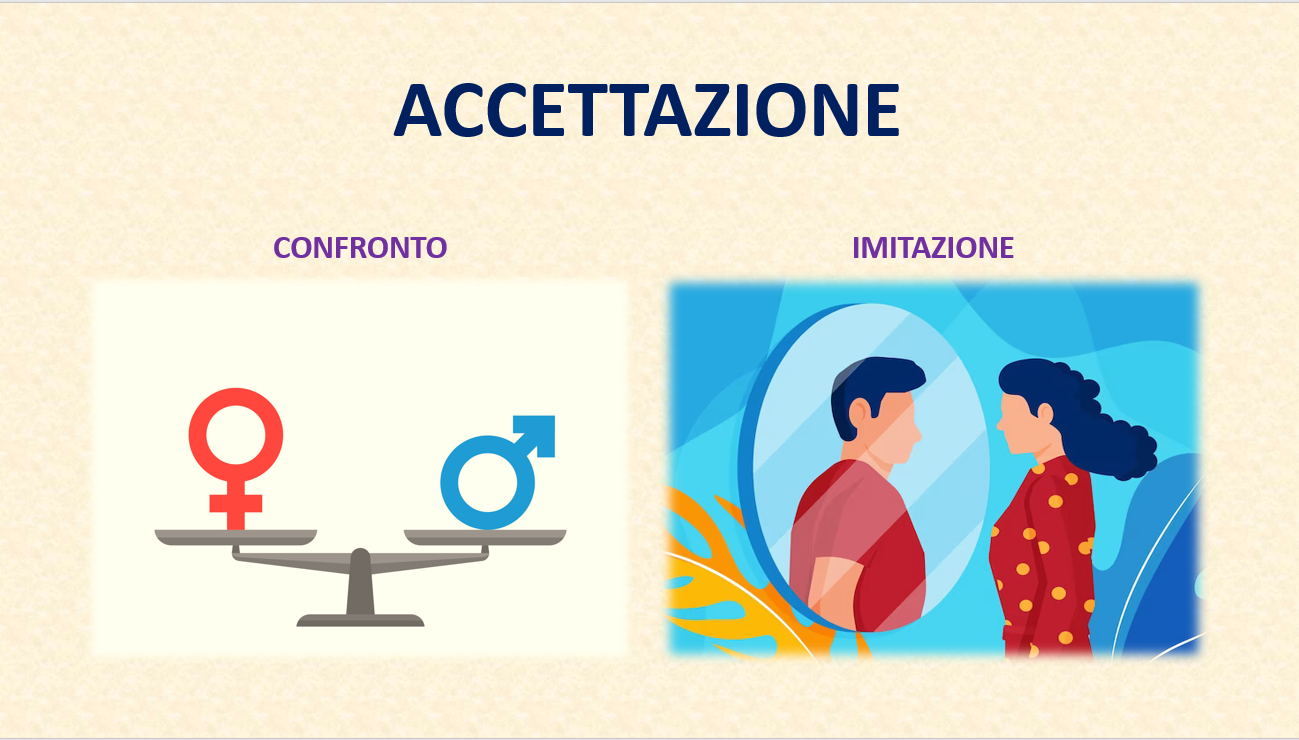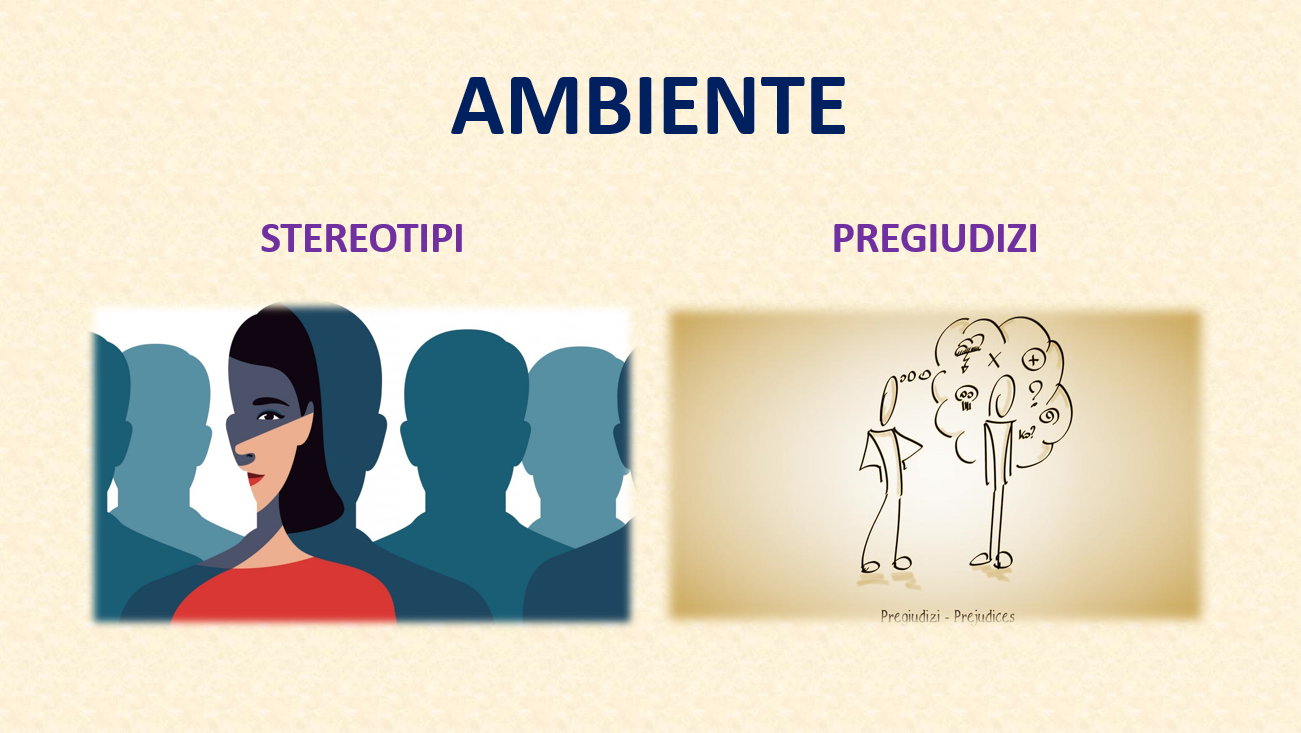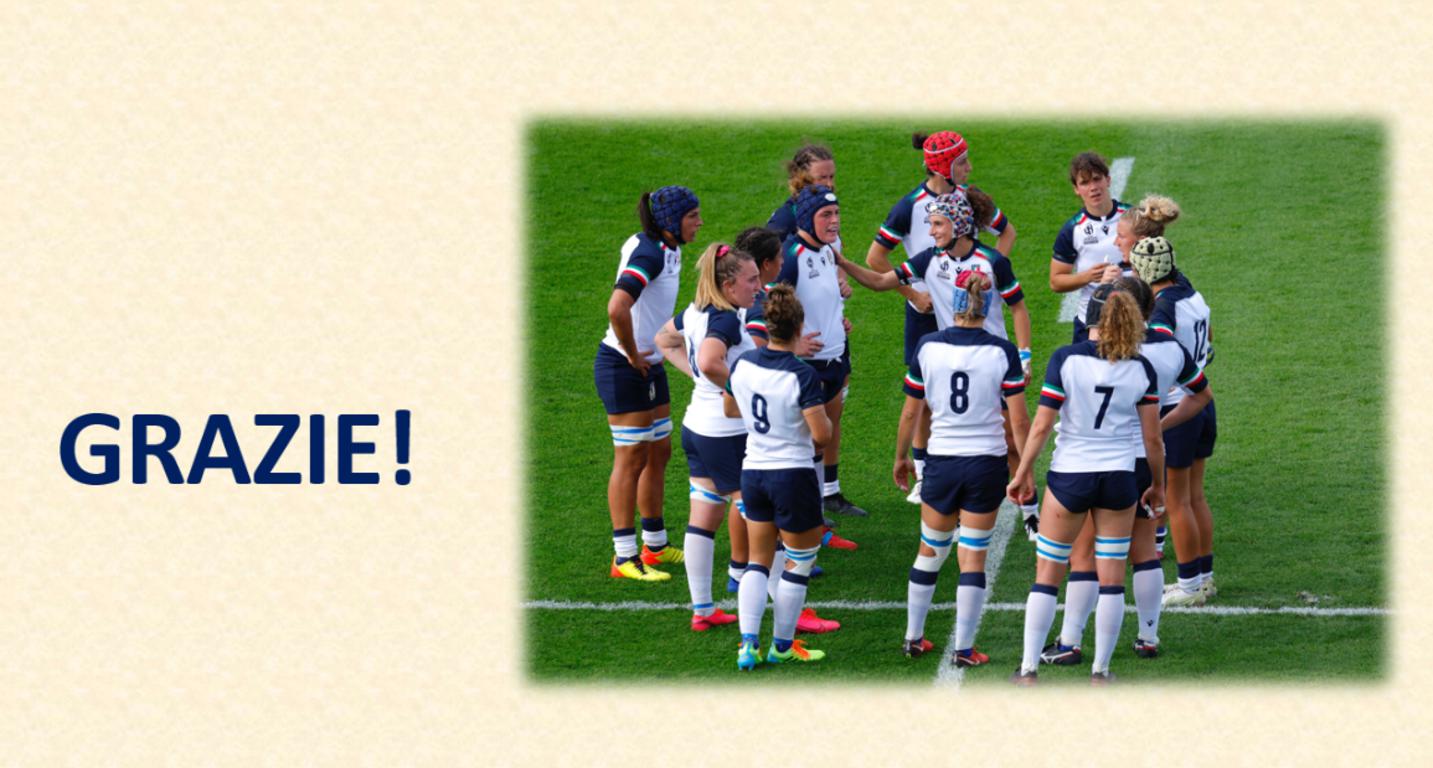ERASMUS+SPORT ‘’WOMAN IN RUGBY’
WORKSHOPS REPORTS
ITALIAN RUGBY FEDERATION
The Italian Rugby Federation organised the two national project workshops on 27 November 2023. Around 350 people between the ages of 12 and 60 attended the two meetings.
1° Workshop - Angelica Balabanoff Middle School, Rome
Around 190 boys and girls from the school's final year attended the Workshop. The participants were between 12 and 13 years old and were divided into three groups. The seminar was then repeated three times for the three groups of boys and girls. Each group consisted of two to three classes. The workshop was held from 8.30 a.m. to 13:30 p.m.
The workshop speakers were Cristina Tonna, the FIR Women's Activity Coordinator, and Simone Olleia, Coach of the FIR Lazio territorial office. Through a graphic presentation prepared for the workshop, they introduced themselves to the participants and told about their rugby experience.
Cristina Tonna presented the agenda for the day, which included the presentation of the project, its goal and the activities carried out until now, the difficulty of access to women's rugby due to the stereotypes and prejudices associated with the sport, and what FIR is doing to overcome them. The final part of the workshop included a drawing activity on posters.
The speakers explained the situation of women's rugby in Italy and the need to promote the sport to spread the concept that everyone should choose the sport they prefer, without prejudice and stereotypes. This is where the WIR project comes from: they told who the partners are and what activities have been carried out, like the survey on the perception of women's rugby and FIR's visit to Romania to meet the project partners.
They explained to the participants what the stereotypes and prejudices are, of which the world of women's rugby is full, and showed a video of a player's try of the Women's National Rugby Team during the Six Nations 2023 that was awarded as the best try of the year in the rugby world. One of the stereotypes that women's rugby falls victim to is that the women's game is less spectacular than the men's game. The speakers showing the video of the try explained how this is not the case, but it is just different ways of playing, each with their own strengths.

While watching the video, Cristina Tonna also pointed out how girls are often accused of not knowing how to do teamwork. Those who frequent the world of rugby know that women's teams as well as men's teams are based on support, the main value of rugby.

Women and men are different, but each has its own peculiarities and strengths, and most importantly both have the same rights and values. If men are physically stronger, women have a more strategic game. Participants expressed their opinions, with some believing that women's sports are as interesting as men's, while some said that some sports are more fun when played by males (soccer) and others are purely for females (dance).
However, they all followed closely what the speakers expressed. Cristina Tonna recounted the difficulty of access to rugby for girls who often find themselves in clubs without locker rooms dedicated only to them and are forced either not to play rugby at all or to quit after a few years. She recounted her experience of playing Rugby at a time when it was not even imagined that women could play.
The activity continued with the divided into groups of participants who were asked to tell through a drawing or writing on poster board what stereotypes they experienced and/or experience in both their sports and everyday activities.
The girls and boys enthusiastically participated in this activity, which ended with the groups displaying their posters. Each group illustrated their work, and many stereotypes experienced by young boys and girls in the world of sports still emerged. Some said they receive phrases such as: ' you are too short to be a goalie'; ' you are strong to be a girl'; 'you are a tomboy (for someone who plays a sport considered by several people to be masculine); etc.).
Below are photos of some of the posters made with translation near each photo.

For everyone: Rugby, swimming, volleyball, tennis, basketball, soccer. Alongside af each sport, the group included stereotypes that everyone experienced. Rugby: I was teased because I wasn't as good as everyone else and I was always on the bench at games. Swimming: I feel excluded because I spend time with the younger kids and my peers treat me badly. Volleyball: since they are all tall they mistaken me for a smaller one just because of my height. Tennis: I feel excluded because they always put me in the weakest group even though I think I don't deserve it. Basketball: at the camp they didn't let me play because I am female. Soccer: whenever I had an away game they didn't have a girls' locker room so I would change in places all shabby.

Women can! That phrase in the center of the poster is surrounded by phrases related to stereotypes suffered by boys and girls: 'When asked to practice Boxing my parents told me NO because I am a girl'; The boys at my gym tease me because they say I am less strong than them. The other large phrase written on the poster mentions: 'Sports is for everyone'.

Rugby is not men > women but men = women

The quote in the center of the poster reads, 'Sports has no gender!' and is surrounded by the following phrases: 'I feel excluded because I was always teased in my sport'; 'they never supported me because of my body'; my parents didn't let me play the sport I like because for them I wasn't physically able

This poster is full of demotivating phrases that boys and girls have received: 'you can't even hit a ball'; 'you're a tomboy'; 'you're as big as the ball'; 'are you sure you have the right body?'; 'you're too short to be a goalie'; 'you're not up to it'; you look like a whale'. In a big way the phrase: 'Don't listen to others, keep following your dreams!!’

In the center of the poster stands out the phrase: Your words can discourage people. Surrounding them are phrases from the boys' and girls' experiences: ' when I first started karate they told me it was a boy's sport and that it was better if I gave up'; 'when I dance hip-hop everyone says it was better if they danced ballet'; 'my cousin wanted to play soccer and despite prejudice now she loves the sport and has been playing it for three years. Other phrases on the poster: sports have no gender; Equality!!

Cristina Tonna talked about how rugby is an inclusive sport from all points of view. The body does not matter in rugby as there is space for all heights and weights.
During the workshop, there were also some speeches by boys and girls who play rugby. In particular, the girls who spoke about their experience were part of the team that won the Italian Student Championships 2023. Those who already play rugby illustrated to their classmates how this sport helps to grow away from stereotypes and prejudices and how it develops friendships that last a lifetime.
During the workshop, there were also some speeches by boys and girls who play rugby. In particular, the girls who spoke about their experience were part of the team that won the Italian Student Championships 2023. Those who already play rugby illustrated to their classmates how this sport helps to grow away from stereotypes and prejudices and how it develops friendships that last a lifetime.
Before the final greetings, Simone Olleia presented the rugby project that will take place at the school in the coming months.
Finally, the speakers thanked the school, the teachers and all the participants of the day for their enthusiastic participation. To thank all the participating classes, the FIR donated a tree for each class through the Treedom project, an association that plants trees in underdeveloped countries to help the country's economy and the environment. Via a QR, it is possible to receive the tree and follow it digitally throughout its life.
The girls were also given a card with a QR code to access the questionnaire on the perception of women's rugby. In fact, FIR is continuing to disseminate the questionnaire and promote the elimination of stereotypes and gender diversity.
Long live Women's Rugby!
2° workshop: Zoom Platform

The workshop, which was directed at all rugby coaches, managers, and club staff, was attended by about 160 people. Below is the poster created and distributed for the event and the schedule of the speakers' speeches.
The Seminar will be held on the ZOOM platform from 18:30 to 20:00 and will have the following programme:
18:30 - institutional greetings by Antonella Gualandri and Francesca Gallina, members of the FIR Federal Council
18:35 - speech by Cristina Tonna, Women's Activities Coordinator, 'Presentation of the WIR Project
19:00 - speech by Andrea Di Giandomenico, Head of Coach Training, 'Contexts and principles of training in the women's sector
19:40 - time for questions and discussion among participants
20:00 - closing of the session
After the institutional greetings, Cristina Tonna introduced the participants to the project, how it came about and the activities that were carried out. In particular, she focused on the results of the survey on the perception of rugby that was carried out for the project and for which 385 responses were collected from girls and young women between the ages of 10 and 18. The presentation (English version), which was explained to all participants, can be viewed here.

Next, Andrea Di Giandomenico, who coached the Women's National Rugby Team for 13 years, took the floor and gave a real technical lecture on women's training. The speaker told about the peculiarity of the female gender with a very peculiar metaphor that makes the point very well: usually when you go to a restaurant or gas station the number of men's toilets is the same as the number of women's toilets, but in front of the women's toilet there is always a line. This is because women need more time than men to go to the bathroom. This cute story is meant to highlight the characteristics of the female gender, which are different from the male gender and therefore need to be respected. In part, it also works for training. Although Andrea Di Giandomenico made it a point to specify that he coached girls as he coached boys, without any concern in either case, nevertheless there is a different technical aspect because girls have different peculiarities and must equally be considered. Women should not emulate men or be compared to them. Everyone has their own valid characteristics.
Below are some slides he presented with translation.
Both during the speaker's talk and at its end, he was asked several questions, such as: 'how should girls' physical issues on performance/motivation be handled?'; 'Can't you separate technique from tactics, or shouldn't you? Does it depend on the context?' Or observations: 'I think the problem is more of a cultural thing and it is a problem of all women's sport more pronounced in both rugby and soccer. In my opinion we should work in schools educating everyone to understand that there is no inequality. It will take years but we need to start (and in recent years there has been an improvement)'; 'in my opinion it is not the methodology that needs to change with girls but the approach to motivation'.

The end of the session was set for 8 p.m., but the participants did not seem to want to say goodbye to the speaker who continued beyond the scheduled time to answer questions. At the time of the greetings, participants thanked for the interesting webinar wishing for more and more growth in women's rugby. Before closing the meeting, participants were advised that in the coming days they would receive an e-mail containing the slides of the two speakers and the link to fill in a satisfaction questionnaire in order to be able to organize again, and possibly improve, appointments like these. Finally, the link to the online page dedicated to the WIR project (https://servizi.federugby.it/woman-in-rugby-it ) was circulated to all present, in case they would like to learn more about the activities carried out and the survey illustrated.
The workshops were organised with the coordination of the FIR Social Responsibility Office.




